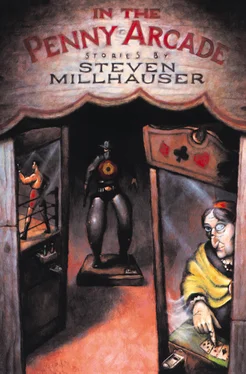When Preisendanz left, August knew that something serious had happened, and that his pleasant way of life was being dangerously threatened, but he felt certain that Preisendanz would come round to the correct view of things when he saw August’s newest automaton. If he reduced his sleep to four hours a night, and worked with supreme concentration, perhaps the new figure could be completed in as short a time as one month. He had already lavished untold hours upon her, and she promised to be his finest creation. She was a young woman, a year or two younger than August, and even he realized that he was half in love with her. He felt like another Pygmalion, but a Pygmalion who knew the secret of bringing his statue to life. He had labored lovingly over the neck and face until she far surpassed his earlier figures in her capacity to reproduce human motions and emotions: her nostrils could dilate, and even her lips possessed an admirable mobility that greatly enhanced her range of expressiveness. She was constructed to walk across the window space and try on a fur coat that a comical, pot-bellied salesman would hold out for her; she would then look at herself in a three-way mirror, experience indecision, and at last, in a burst of joy, decide to purchase it. After paying the correct amount in beautifully reproduced little bills and coins, she would walk along in her new fur coat, crossing the entire display area until she disappeared behind a curtain. The little drama called for a high degree of facial expressiveness, and August was still dissatisfied with the mirror episode, which did not quite reveal her inner struggle. But far more important was the final walk, when every motion of her body must express her delight. There was no doubt: he had fallen in love with her, and felt that he was giving her the glorious gift of life.
Business declined slightly during the next week. Preisendanz was anxious, but not yet alarmed: there was still no sharp falling off, and he felt he could afford to wait until August was ready with the new figure, about which the boy had been unusually secretive. Meanwhile Preisendanz fired the sleeping actor, removed the wax figure, and placed in the window of beds and mattresses a pretty twelve-year-old girl, the blue-eyed daughter of a woman friend who was a painter’s model. The girl wore a short, frilly nightdress and was instructed to make the beds with different kinds of sheets, plump up the pillows, flop about on the mattresses, and in general keep moving about as much as possible. Preisendanz had selected her with great care: she had an angelic face and no breasts, so that she could appear in his window without scandal, but her legs were coming along nicely, and the movements of her little rump were really very appealing.
A week later there appeared in the mattress window of Die Brüder Grimm two new automatons. They were blue-eyed girls in frilly nightdresses, and the way they wriggled about was simply — well, indecent. The crowds enjoyed it immensely, for it seemed to be a great joke — a joke unmistakably directed at the Preisendanz Emporium. Preisendanz was frantic, and was only partially soothed when August, looking pale and drawn, assured him that the new figure would be ready by the end of the week. Preisendanz wondered whether in the meantime he might try a new idea: the girl in the nightdress might be placed in a tub of water, from which she could emerge shivering to take refuge in a warm, soft Preisendanz bed. The wet nightdress clinging to her ripening curves might be extremely effective. He was still turning this idea over in his mind when August announced that his figure was ready. That night, behind the closed curtain of the display window, Preisendanz watched the young woman walk across the floor, try on her fur coat, and walk back, while August stood by, pale and grim. As August watched the shy maiden he forgot his exhaustion, for he knew without arrogance that he had created a work of supreme beauty. When it was over he turned to Preisendanz, who appeared strangely meditative. Preisendanz muttered a few words, praised the wrong thing (the putting on of the coat was in fact a little awkward, the shoulders needed a bit more work), and left for dinner. August, elated by his triumph, and puzzled by Preisendanz’ curious behavior, returned to his studio to work on the shoulder: the left one in particular was unsatisfactory. When he opened his eyes he realized he had fallen asleep at his workbench. Before him lay his Fräulein, a few hands, an envelope. There was still a half hour until opening time. He washed quickly and hurried down to the display window, where parting the back curtain he stopped in amazement.
There in the window, before a small crowd only some of whose eyes lifted to the parted curtain where he stood, two hideous automatons were marching back and forth. Their gestures were jerky; they had plump calves, fat behinds, and grotesquely protuberant bosoms. Their eyes rolled, their shiny red mouths appeared to smirk. He recognized them at once as the work of his crude rival. Wind from a concealed bellows was being blown at them through a tube, so that their dresses were pressed against their bodies and sometimes fluttered up.
August, feeling dazed, hurried away to find Preisendanz. He found the owner in the toy window, over which the front curtain had been drawn. Preisendanz was pacing back and forth excitedly while a handsome young man with thick, wavy yellow hair was setting up a pair of ugly child-automatons, one of whom was dressed in nothing but a pair of white drawers with pink bows. Preisendanz, who kept looking at his watch, seemed irritated at seeing August, and, while keeping his attention upon the child-automatons, asked whether August had not received the note which had been sent up to him. August, who suddenly realized what was happening, became strangely calm and returned to his workshop, where opening the envelope he read that financial considerations of the most urgent kind had regrettably forced Herr Preisendanz to terminate their association. A generous sum of money was enclosed. August removed a single small bill — enough to cover the cost of the train and coach home — gathered his few belongings and his Fräulein, and was about to leave when he noticed the life-sized boy writer in a corner. Stepping over to it, he prepared to remove the three gear trains he had added, thought better of it, left the room, and took the first train back to Mühlenberg.
THE MAGIC THEATER
August had not seen his father for nearly two years. Their meeting was tearful, as their parting had not been, and once again August took up his work in the watchmaker’s shop. Joseph seemed remarkably unchanged, as if time did indeed obey different laws in the shop of clocks, but August sensed a slight difference that at first he could not account for. He soon realized what it was: his father moved a little more slowly. It was as if Joseph’s body had aged while his face had remained unchanged by time. For that matter, August had seen in his father’s face how he himself had changed, and his reflection in that mirror startled him and made him seem strange to himself, even though he knew perfectly well that he had grown at least a foot over the last two years and now sported a thick, soft mustache. But the change that most troubled him was in the repairing of watches. Although he enjoyed his old trade, and worked for his father as a virtual partner, he found himself impatient at the loss of hours from his true work. Preisendanz had spoiled him — he had forgotten what it meant not to labor day and night on the increasingly complex and beautiful processes of automaton clockwork — and he had to struggle against an inner restlessness that seemed to him almost a betrayal of his love for his father. Joseph knew where his son’s heart lay, and urged him to reduce the hours he spent in the shop, but the very fact of his secret restlessness made August unwilling to accede to it. Meanwhile he had his nights, and his precious Sundays. He converted his old room into a workshop, and with the money he had saved as well as the money he now earned he ordered materials from Paris, London, and Berlin. During his Berlin years he had become slowly adept in the highly complex matter of ordering supplies, and although he could never hope to duplicate the superb conditions of his work-life in the Emporium, when the need for a tool, or a rare kind of cloth, or a chemical dye was quickly satisfied by the expert knowledge of Preisendanz, and although he now had far less money at his command, nevertheless he was soon able to work well enough under the new conditions. And he was free of Preisendanz. He no longer had to care about store windows, and customers, and the imitation of clothes and goods, but could devote his energy to the only thing that mattered: the creation of living motion by the art of clockwork. Never again would he permit his creatures to be used in windows, never again would he sell them into slavery. The crude old automatons in his father’s window were permitted to remain, for he thought of them as toys, but he never added a new one.
Читать дальше












